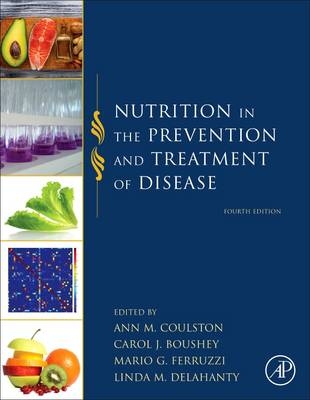
Nutrition in the Prevention and Treatment of Disease
Academic Press Inc (Verlag)
978-0-12-802928-2 (ISBN)
Generating and analyzing data that summarize dietary intake and its association with disease are valuable tasks in treating disease and developing disease prevention strategies. Well-founded medical nutrition therapies can minimize disease development and related complications. Providing scientifically sound, creative, and effective nutrition interventions is both challenging and rewarding.
Ann M. Coulston, MS, RD, has a more than 20-year history of clinical research at Stanford University Medical Center where her research centered on carbohydrate and lipid metabolism, the nutritional management of diabetes, and insulin resistance. She has provided nutrition consultation to the food and healthcare industry, public relations firms, and Internet companies. She is past-president of the Academy of Nutrition and Dietetics (formerly the American Dietetic Association) and has been recognized by the American Dietetic Association Foundation for excellence in the practice of clinical nutrition and the practice of research. Carol J. Boushey, PHD, MPH, RD, is an Associate Researcher in the Epidemiology Program of the University of Hawaii Cancer Center and an Adjunct Professor in the Nutrition Science Department at Purdue University. Her research includes dietary assessment methods, dietary patterns, and quantitative methods. At the Cancer Center, she directs the Nutrition Shared Resource. She serves on the editorial board of the Journal of the Academy of Nutrition and Dietetics and the Nutrition Committee of the American Heart Association. Mario G. Ferruzzi, PhD is a Professor of Food Science and Nutrition at Purdue University. His research interests are in the area of phytochemical bioavailability, metabolism and their role in chronic disease prevention. Additionally, he has industrial experience in product research and development. Prior to joining Purdue in 2004, he was a Research & Development Scientist with Nestlé R&D in Marysville, OH and Lausanne, Switzerland. He is a member of the Institute of Food Technologists (IFT), the American Society for Nutrition (ASN), and the American Chemical Society (ACS). Linda Delahanty, MS, RDN, LD is Chief Dietitian and Director of Nutrition and Behavioral Research at Massachusetts General Hospital’s Diabetes Center and Assistant Professor of Medicine at Harvard Medical School. She is a nationally recognized authority on nutrition and lifestyle interventions for the treatment of diabetes and obesity. She was a recipient of the National Award for Excellence in the Practice of Dietetics Research and the Medallion Award for lifetime achievement in the dietetics profession from the Academy of Nutrition and Dietetics and received the American Diabetes Association’s Outstanding Educator in Diabetes Award in 2015.She was chair of the Dietitians Committee for the landmark Diabetes Control and Complications Trial and was one of the architects of the lifestyle interventions for the Diabetes Control and Complications Trial, the Diabetes Prevention Program, Look AHEAD and the TODAY study. Ms Delahanty has been a co-investigator in four NIH-funded multi-center clinical trials and is currently one of the Principal Investigators for the NIH-funded REAL HEALTH Diabetes study to translate the Look AHEAD lifestyle intervention into primary care.
Section I: Research Methodology
Part A: Assessment Methods for Research and Practice 1. Dietary Assessment Methodology 2. Assessment of Dietary Supplement Use 3. Physical and Clinical Assessment of Nutritional Status 4. Energy Requirement Methodology 5. Metabolomics
Part B: Research and Applied Methods for Observational and Intervention Studies 6. Translational Research: Concepts and Methods in Dissemination and Implementation Research 7. Overview of Nutritional Epidemiology 8. Analysis, Presentation, and Interpretation of Dietary Data 9. Current Theoretical Bases for Nutrition Intervention and Their Uses 10. Nutrition Intervention: Lessons From Clinical Trials 11. Biomarkers and Their Use in Nutrition Intervention
Section II: Nutrition for Health Maintenance, Prevention, and Disease-Specific Treatment
Part A: Food and Nutrient Intake for Health 12. Nutrition Guidelines to Promote and Maintain Health 13. Nutritional Recommendations for Athletes 14. Nutrition for Children With Special Health Care Needs
Part B: Dietary Bioactive Compounds for Health 15. Bioavailability and Metabolism of Bioactive Compounds From Foods 16. Antioxidants in Health and Disease 17. Choline and Brain Development 18. Dietary Phytochemicals in Neurodegenerative Disease 19. Diet and Supplements in the Prevention and Treatment of Eye Diseases 20. Phytochemicals in the Prevention and Treatment of Obesity and Its Related Cancers
Part C: Overweight and Obesity 21. Genetics of Nonsyndromic Human Obesity, With Suggestions for New Studies From Work in Mouse Models 22. Obesity: Overview of Medical Treatments and Interventions 23. Surgery for Severe Obesity 24. Behavioral Risk Factors for Overweight and Obesity: Diet and Physical Activity 25. Snacking and Energy Balance in Humans
Part D: Cardiovascular Disease 26. Genetic Influences on Blood Lipids and Cardiovascular Disease Risk 27. The Role of Diet in the Prevention and Treatment of Cardiovascular Disease 28. Nutrition, Lifestyle, and Hypertension
Part E: Diabetes Mellitus 29. Genetics and Diabetes 30. Obesity and the Risk for Type 2 Diabetes 31. The Role of Diet in the Prevention and Treatment of Diabetes 32. Nutritional Management for Gestational Diabetes
Part F: Cancer 33. Interaction of Genetic Factors With Nutrition in Cancer 34. Nutrition and Cancers of the Breast, Endometrium, and Ovary 35. Nutrition and Prostate Cancer 36. Nutrition and Colon Cancer
Part G: Gastrointestinal Health and Disease 37. Intestinal Microbiota and Diet in Health 38. Gut Microbial Metabolism in Health and Disease 39. Nutritional Management of Inflammatory Bowel Disease and Short Bowel Syndrome 40. Nutrient Considerations in Lactose Intolerance 41. Nutritional Considerations in the Management of Gluten-Related Disorders 42. Nutrition and Cystic Fibrosis
Part H: Bone Health and Disease 43. Current Understanding of Vitamin D Metabolism, Nutritional Status, and Role in Disease Prevention 44. Osteoporosis: The Early Years 45. Osteoporosis in Adults
| Erscheinungsdatum | 19.05.2017 |
|---|---|
| Verlagsort | San Diego |
| Sprache | englisch |
| Maße | 216 x 276 mm |
| Gewicht | 3260 g |
| Themenwelt | Sachbuch/Ratgeber ► Gesundheit / Leben / Psychologie |
| Medizin / Pharmazie | |
| Technik ► Lebensmitteltechnologie | |
| ISBN-10 | 0-12-802928-5 / 0128029285 |
| ISBN-13 | 978-0-12-802928-2 / 9780128029282 |
| Zustand | Neuware |
| Haben Sie eine Frage zum Produkt? |
aus dem Bereich


